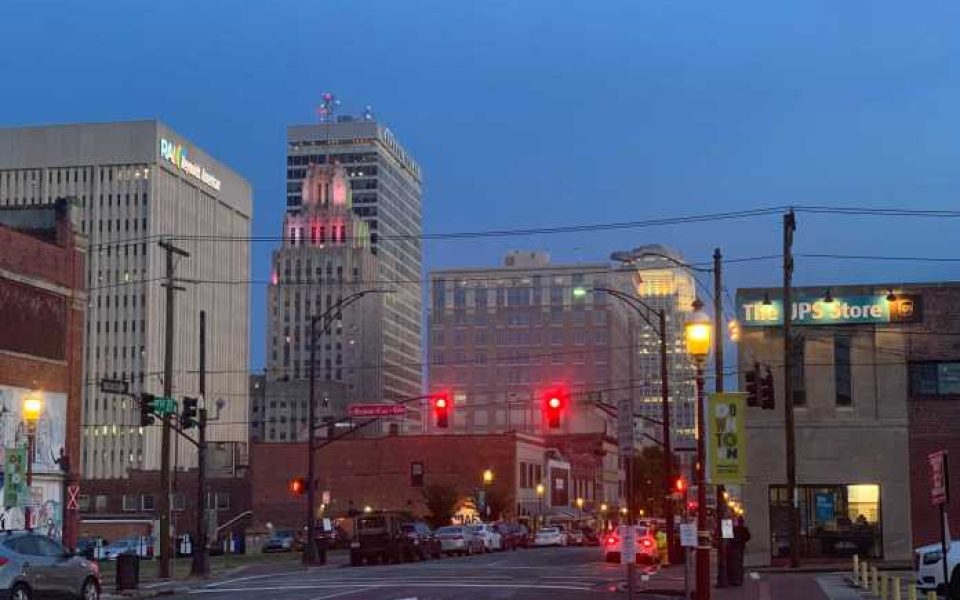When it comes to helping her clients, Keena McMillan keeps hitting the same wall. More and more often, the caseworker at the Winston-Salem Salvation Army said she has trouble finding affordable residences for people who need housing.
“It has been an issue that we’ve seen,” McMillan said. “Clients come in through one of our programs needing to be housed. That’s part of our process: to find affordable housing. But the way things are right now, that’s very difficult.”
The key word here is “affordable.” A two-bedroom apartment in Winston-Salem can rent for anywhere from $550 to $2,700 a month, which advocates say is not affordable to many Winston-Salem residents. McMillan says several of the apartment complexes she has worked with before have skyrocketed in price in recent months.
As the city found in a 2018 study, fluctuations in housing affordability burden lower-income families the most. Families earning less than $20,000 a year are more than 90 percent likely to be cost-burdened, meaning more than one-third of their income goes toward housing.
“With the pandemic, a lot of people weren’t working or getting the pay they were before,” said McMillan. “The waiting list for income-based housing is so long that a client will end up homeless before they can move in.”
Rent in Winston-Salem has continued to rise since the pandemic began, as they have across the country. Since the beginning of 2021, housing nationally has gone up 9.2 percent according to a national survey by Apartment Lists. In Winston-Salem, RENTCafé reported that rent has gone up 10 percent between June 2020 and June 2021. But according to advocates, housing affordability in the city was a problem long before COVID-19, largely because of a lack of available units.
The gap McMillan sees in Winston-Salem is that there is too big of a leap for people who might not have needed low-income housing in the past but who cannot afford Winston-Salem’s rising rates. The average monthly rent as of June 2021 is $991 according to RENTCafé.
Richard Angino, owner and managing member of Third Wave Housing, a company that forms professional partnerships to benefit tenants, says the solution is to build more inventory. As of 2018, 47 percent of housing in Winston-Salem was built between 1960 and 1979. Although he believes Winston-Salem has enough land to build more affordable housing, there are not enough apartments in the city to keep everyone housed.
Based in Winston-Salem, the organization has worked toward creating more affordable housing in Winston-Salem.
“The amount of population that we’ve grown, we have a demand of 14,000 units and nowhere near that many,” said Angino. “We’ve lost more apartments than we’ve gained in the last five years. The rental complexes have been able to raise the rents quite a bit because there’s no competition.
“We have plenty of land and talented people who can build in Winston-Salem,” he continued. “We just don’t have enough tools from the city or the county.”
Triad City Beat did not hear back from representatives at the city in time for publication.
Currently, Angino says they are looking at location near downtown to develop a neighborhood.
“There’s an eight-acre site that’s vacant,” he said. “It used to be residential, the same as the western part of downtown. Basically what happened was in the 1920s the city determined that even though it was a vibrant community, they zoned it industrial.”
Angino recently finished a project called Essex Place, a property consisting of 48 units for people whose incomes are between 30 and 60 percent of the area median income. He says that before he even broke ground on this building, people were calling him asking when they could move in because demand for affordable housing is so high.
The city was able to provide money for this, a total of $1.35 million for Essex Place and one other project.
For the last three years, housing advocates groups have also asked the city to fund the Peters Creek Initiative to turn the former Budget Inn into an affordable apartment complex.
“There was an old hotel there that was dilapidated and people were living there,” said Andrea Kurtz of United Way Forsyth. “A group formed to figure out how to take the hotel and turn it into something that would support this community. They formed a collective to build an affordable housing collective on this sight. They’re still missing gap funding to build it affordably, so they’re looking at how to finance that.”
According to Kurtz, there are several ways to keep costs down when building affordable housing. She mentioned that many cities invest in new apartments in order to keep the costs down.
“Whether a unit is going to rent at $1,500 or $600 a month, with the exception of a couple of amenities, it cost essentially the same to build them,” Kurtz added. “That would keep the rents affordable to people who currently live there. Otherwise they would be forced to build something that will push people out of that neighborhood.”
Join the First Amendment Society, a membership that goes directly to funding TCB‘s newsroom.
We believe that reporting can save the world.
The TCB First Amendment Society recognizes the vital role of a free, unfettered press with a bundling of local experiences designed to build community, and unique engagements with our newsroom that will help you understand, and shape, local journalism’s critical role in uplifting the people in our cities.
All revenue goes directly into the newsroom as reporters’ salaries and freelance commissions.


[…] it has across the country. Housing was an issue before COVID, and rents went up across the country 10 percent between June 2020 and June 2021. Developers are looking for ways to build more units, such as […]